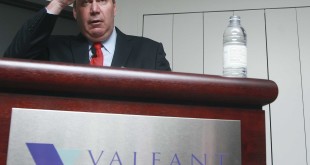Supposedly, being a United States senator is prestigious job. I mean, they only have 100 available positions; this isn’t like being the lead burrito wrapper at Chipotle.
Yet, the incompetence, lack of cohesiveness and private sector experience, and sluggishness of both the Senate and House of Representatives makes my local Starbucks look like a black-belt Kaizen operation.
The “bi-partisan” tag team of Senator Ron Wyden (D-OR) and Chuck Grassley (R-IA) is the most recent example of too much public service and too little real world experience. Yesterday, they released a report titled, “The Price of Sovaldi and Its Impact on the U.S. Health Care System.” Report can be read here: Senate Finance Committee Report on Sovaldi and Harvoni
The report is an enthralling 144 pages, and took these two wanna be Hemingways 18 months to write. I’m guessing it was their interns or aides that actually produced the content.
The premise and conclusion of the report can be summarized as follows: Gilead purposely established an exorbitant and outrageous price on Sovaldi and Harvoni, which has led to many patients not being able to access the drugs.
For those unaware of the prices, Gilead prices Sovaldi $84,000 for a 12-week duration, and Harvoni, a follow-up pill that’s even more effective, with a list price of $94,500.
At first glance, most people (including myself), would believe this is a tremendously expensive drug. And it is; this post isn’t meant to dispute that obvious fact.
However, I’d like to share with you, the educated and level-headed reader, where this report fails on many levels and why government can be so contradictory and inefficient.
If you’re unfamiliar with Solvadi or Harvoni, either read my Analyst Report on Gilead or pay attention to commercials run during nightly sporting events. These two blockbuster drugs CURE (not TREAT) Hepatitis C.
Again, since polio, what other disease has been cured? Here’s a dirty secret: 99% of pharma companies make boat loads of cash because they treat, not eradicate. Essentially, the customer is always coming back.
I’ve seen family members and friends viciously struggle with as cancer or autoimmune disorders, just to name a few. It’s heartbreaking. But you know what, nothing is eliminated; it’s only managed at best.
What Wyden and Grassley laughably excluded is Sovaldi and Harvoni will decrease long-term health costs, such as hospital stays and doctor visits, and prescription refills. This is obnoxiously expensive too.
These two court jesters barely scratch the surface in discussing the role of health insurers, which lessens the impact on patients. As Chris Rock so eloquently put it, “Insurance should just be renamed ‘in case shit happens.’”
Their sole focus was on list price, neglecting negotiated discounts and health insurers’ responsibility, and disregarded the fact that Gilead has basically given away these drugs s in third world countries.
Moving away from what they excluded, let’s discuss what they included. For starters, check out the comedic headline title on the official U.S. Senate Committee on Finance website:
“Wyden-Grassley Sovaldi Investigation Finds Revenue-Driven Pricing Strategy Behind $84,000 Hepatitis Drug”
I guess in the world of business savvy public service leaders, revenue-driven ideas are a big no-no. Clearly all entities, whether they are government or free-enterprise, should avoid any avenues or tactics that lead to BRINGING IN money.
Also, Behind should be spelled behind; these numb-nuts even screw up third grade grammar rules.
This mindset is one of the many catalysts that have created a national debt of $18.1T (approximately 74% of GDP). This purposeful ignorance of money in vs. money out is attributed to both parties so please save any comments about being a bullheaded conservative stalwart or nutty liberal socialist.
You know who also has pursued revenue-driven strategies? Hmmm… How about everyone’s favorite company Apple? I’ve never heard anyone utter that iPhones are reasonably priced, or data usage is fair.
We all know people who couldn’t survive without their phones (while a sad statement, this isn’t a joke). If an iPhone was $5, you cannot argue against the premise that an informed individual is better off.
GM and Ford have also instituted a crazy concept of revenue-driven strategies. But we do not give away cars to people, even though it would help them get to that job interview.
Nor do we force home builders to drastically reduce their construction price, only to see them go bankrupt. I would love a world of zero homelessness, but it’s not the reality.
And don’t even get me started on medicine’s sham of a cousin, dentistry (extra Seinfeld). You and I both know people who need dental work for aesthetical and physical needs. We don’t have Senators investigating Tim Wattley for over-charging on a simple teeth cleaning.
We can all agree that low price and available health care is ideal. However, simply saying prescription drugs are way too expensive, and supporting that thesis on a short-sighted purview with no recommended alternative, is government at its finest.
If you enjoy the content at iBankCoin, please follow us on Twitter





Boyaj – a thoughtful write up for sure. Here’s what the ham & egger class is most upset about: http://www.bloomberg.com/news/articles/2015-06-01/hepatitis-cruise-india-trips-among-plans-to-save-on-1-000-pill
How in the hell are these other dirt bag countries getting this junk so cheap compared to us? No wonder our health insurance is going parabolic. The racket has to get fixed. Fair and equal pricing for all customers, no matter what country they reside.
Thanks for the compliment Buccs. I’ve been involved in health care finance for a while now, working on deals with both providers and payers.
To answer your question, my initial thought is that because of the lack of red tape and the minimal amount of government hurdles and regulations (such as FDA trials for 7-8 years), they can distribute without incurring all those outside expenses.
Don’t get me wrong, government plays a role in screening for treatments and approving a mix of chemicals that will go into humans. However, when you have desperate patients with their only chance of survival being a drug in trial, it’s damn near impossible to not just let them take it.
Another nice post. Thanks for sharing.
Thanks djmarcus. The next post will be exploring how I’m interpreting the credit markets’ risk appetite; it’s an area I’ve been interested in more and more, and hope to continue learning about. This is your forte and would love feedback (positive or negative).
The damn limits on reimporting drugs needs to be repealed. That alone would dramatically improve the health care situation in the US. Why do we need to pay more to subsidize the rest of the world…
There has to be some sort of violation of the Robinson-Patman Act going on with all this? https://en.m.wikipedia.org/wiki/Robinson%E2%80%93Patman_Act